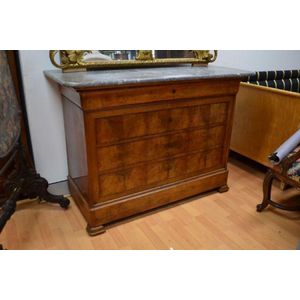Late 19th Century Satinwood Painted Cabinet
Fine antique late 19th century satinwood dome topped cabinet, painted with baskets of flowers and musical trophies, of bow front shape, with cross banded inlaid decorated edge, all standing on shaped splay feet, 145 cm high, 68 cm wide. Ex Pixie Skase collection
You must be a subscriber, and be logged in to view price and dealer details.
Subscribe Now to view actual auction price for this item
When you subscribe, you have the option of setting the currency in which to display prices to $Au, $US, $NZ or Stg.
This item has been sold, and the description, image and price are for reference purposes only.
- Inlay - Decorative patterns inserted into the main body of a piece of furniture, generally in wood of contrasting colour and grain, though brass, ivory, ebony, shell and sometimes horn have been used. Inlay may consist of a panel of well figured timber inset into a cabinet door front, geometric patterns, or complex and stylized designs of flowers, swags of foliage, fruits and other motifs. As a general rule, in pieces where the carcase is constructed in the solid, the inlay is relatively simple such as stringing, cross banding and herringbone banding. Where more elaborate and decorative work was required veneer was used. Inlay has been fashionable from at least the latter half of the 17th century, when a variety of elaborate forms were developed
- Bow Front - The front is shaped in a gentle curve or bow. Introduced during the 18th century, the bow-front is associated with furniture of the Hepplewhite and Sheraton period, though of course the form continued to be used throughout the 19th century. Bow-fronted pieces are usually veneered, although some were cut from the solid wood. Where veneer is used, the carcase is cut either from pine or deal, or sometimes the front was built up and shaped with small timber 'bricks'. Commonly used on various types of furniture including chairs, settees, chests, side tables, sideboards and display cabinets.
- Satinwood - Satinwood is a dense pale gold coloured timber that was imported into Britain in the second half of the 18th century, and early 19th centuries from the East Indies and the West Indies. The name derives from the satin-like surface sheen when the timber is polished.
It was used in the solid, as a veneer and in inlays. As well as furniture, satinwood was used for making musical instruments, barometers, boxes and clocks.
It will usually be found on only the very best quality objects, presumably because of of its cost at the time.
This item has been included into following indexes:
- cabinets, material
- meat covers / food covers / dish covers - pewter 1,629
Visually similar items

Antique French Louis Philippe walnut commode / chest, with marble top, 96 cm high, 130 cm wide, 54 cm deep
Sold by
in
for
You can display prices in $Au, $US, $NZ or Stg.

Good French carved walnut Louis XV style enfilade buffet
Sold by
in
for
You can display prices in $Au, $US, $NZ or Stg.

Vintage French marble topped floral marquetry enfilade buffet, 106 cm high, 198 cm wide, 58 cm deep
Sold by
in
for
You can display prices in $Au, $US, $NZ or Stg.

French walnut mirrored back sideboard, two doors and drawers, carved with pomegranates, approx. 140 cm x 115 cm
Sold by
in
for
You can display prices in $Au, $US, $NZ or Stg.
